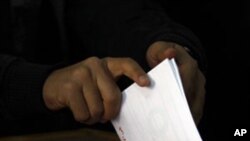Egyptians, voting in a nationwide referendum Saturday, overwhelmingly approved changes to their constitution. The measure was considered to be the first major step on their path toward democracy after a popular revolt earlier this year toppled the regime of long-time President Hosni Mubarak.
More than 14.1 million voters, or 77.2 percent of those who took part in the poll, approved the constitutional amendments, while 4 million, or 22.8 percent, voted against them. The government said Sunday the 41 percent turnout among the 45 million eligible voters broke all records for recent elections. Davin Hutchins spoke to VOA’s Cairo Bureau Chief Elizabeth Arrott about the meaning of the vote.
Arrott: Egyptians were voting on a package of amendments to their constitution, a simple “yes or no vote” on a measure that would open up new elections to more people and more parties than in the past. There are also provisions on limits on the terms that a president can serve – two four-year terms – something that was part of the protests that led to all this. People were tired of having a president who had been in office for nearly thirty years, and those 14 million [who voted in favor] represent about 77 percent of the voters [who took part in the poll]. So it was quite an overwhelming victory in favor of the amendments.
Hutchins: Do you think that the Muslim Brotherhood and remnants of the NDP (National Democratic Party) played a big role in getting out the vote, in getting people to show up at the polls?
Arrott: Yes, both of these groups used their considerable experience in organizing their followers in the lead-up to the referendum. The NDP, because it was the main force in politics over the last 30 years, and the Brotherhood, although it is banned, it was very good, as many outlawed groups are, in figuring out alternative ways of keeping their base together. And both of them are in favor of the amendments, which they have been arguing would help Egypt get going to move to a new government.
Hutchins: Did you get a sense that the pro-democracy youth groups that we have been interviewing on VOA, stayed away from the polls because they wanted an entirely re-written constitution. Do you think their attitude toward the referendum changed the end results at all?
Arrott: They certainly did not get the numbers they expected. Actually, it seemed that they were out in as much force as they could muster. Most of them, as you know, had wanted a whole new constitution, arguing that there is no point in patching up a flawed one. But they were outvoted despite their online campaign and street effort to get people to vote “no.”
It’s interesting that most of the “no” votes came from Cairo and Alexandria, the big urban centers. There was very little from the conservative countryside, where people may place more faith in the military, the Brotherhood and the remnants of the NDP as still being someone who could lead the passage of chance.
Hutchins: And, finally, looking to the future – how will this weekend’s results shape the parliamentary and the presidential elections to be held later in the year?
Arrott: It does pave the way to keep to the schedule that the military, which has been in charge since President Mubarak stepped down last month, has come up with. And that has the parliamentary election, followed by the presidential election, [to be held] in about the next six months. And that is what perhaps those who were in favor of a “no” vote were most concerned about – more than about the constitution, that the process was too rushed. And they felt that this timetable would give an advantage to the established groups, like the Muslim Brotherhood and the NDP, to get organized, and certainly those fears seem to have been borne out to some extent by the results we saw on Sunday.
Egypt Constitutional Referendum – What the Results Mean
















